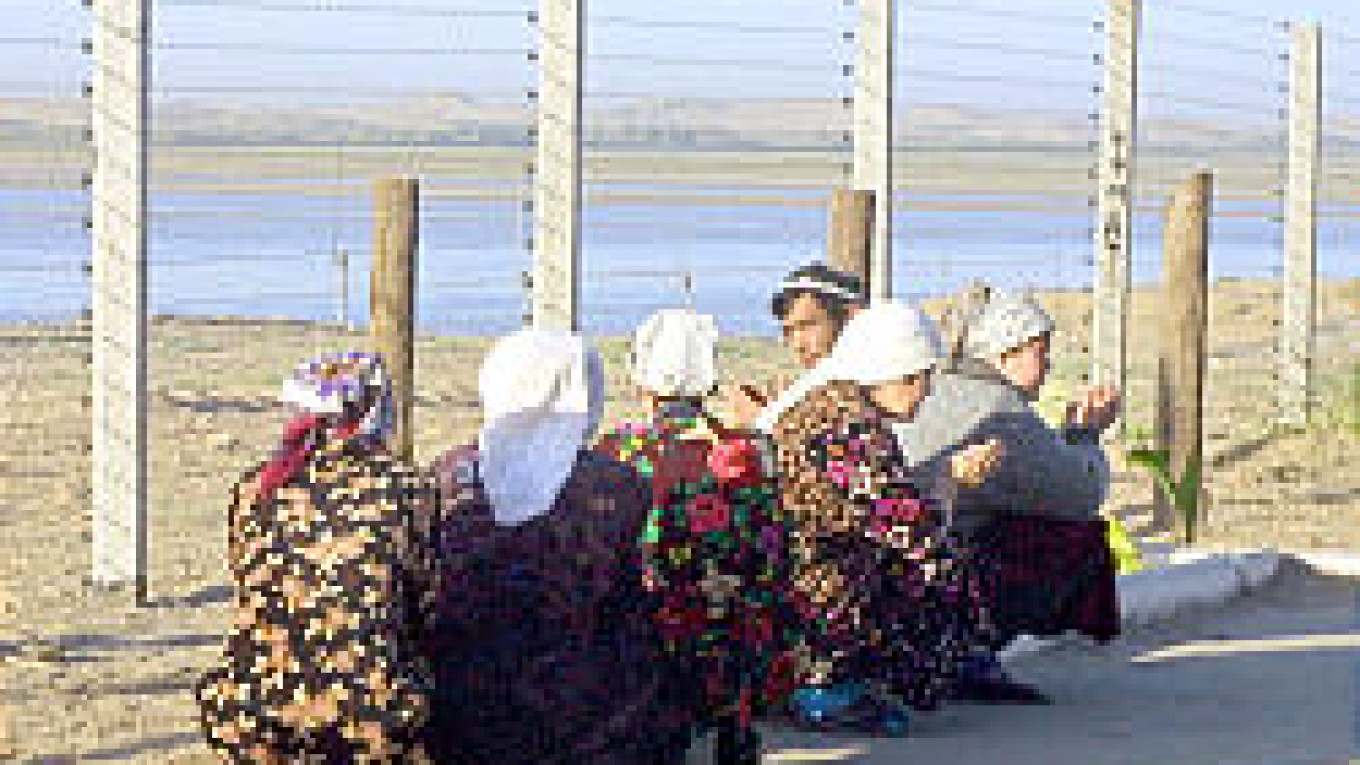On the southern edge of Central Asia, Termez was a major forward base for the Soviet army's war in Afghanistan. Once totally off-limits to foreigners, it is poised again to take up its position on the front line as the United States moves closer to anticipated attacks.
Along the border outside town, the local mosque is being swept with a stick broom to prepare for the weekly city festival, in which families sip tea with a view of the Amu-Darya River and the Afghan plains just tens of meters away.
Uzbekistan has offered to help Washington, and President Vladimir Putin has said air bases in Central Asian nations could be used for U.S. attacks. Repeated unconfirmed reports have said U.S. planes already have landed in Uzbekistan.
At the lone bridge between Uzbekistan and Afghanistan -- built by the Soviets for their tanks to ride south to victory, but instead the symbol of their retreat -- two soldiers stand guard with rifles next to a dug-in armored personnel carrier.
Along other parts of the frontier, guard towers peer over the scraggly fence that marks the border, closed in the last few years since the Taliban gained power in parts of northern Afghanistan. The Uzbek authorities have put down violence by home-grown Islamic rebels and fear the influence of the Taliban.
Although only separated from Afghanistan by the trickle of the Amu-Darya -- dry enough in some spots that it appears one could simply walk across -- residents have almost no ties to their neighbors, viewed as a nation of lawlessness and extremism. The word "Afghan" in the Uzbek language means "someone who has left."
The growing talk of war around the world has also had little effect on locals accustomed to living in the heart of turbulent Central Asia, in a part of the country that dips down between Tajikistan and Turkmenistan to touch Afghanistan.
"You can ask anyone on the street, no one's afraid," Mayor Abdurayim Choriyev said in an interview Tuesday. "It's all as usual here."
Still, workers appear to have quickened their pace in finishing previously planned border reinforcements. An area near the mosque that was wide open over the weekend with only fenceposts is already laced with barbed wire, and work is continuing on further rows of barriers and trenches. Border guards have also increased their vigilance.
But that's one of the few signs of changes to life here. On the road leading north from the bridge, workers patiently paint a white dotted line in the middle of the paved road leading to the main air base for the region at Kakydi. There, about 70 kilometers from the border, a set of three rusting fighter jets sits on display alongside the road, but there's little else to be seen.
Military facilities and housing dot the city of Termez, which was off-limits to all except for residents with special permits during the Soviet era.
Many Uzbeks are hesitant to comment on the political situation here, where many of the Soviet-era institutions for controlling the population are still in place, but with different names. Pictures and slogans of communist icon Lenin have merely been replaced with those of President Islam Karimov, who has run this country since before its 1991 independence.
"They can do what they want over there [in Afghanistan]; here, everything is calm -- honestly," said Radjap, who uses only one name, the guide and custodian at the mosque.
Reporters asking questions about a possible U.S. presence in the area also quickly attract the attention of police at the checkpoints leading into Termez.
Still, the city has been touched by the more recent violence in Afghanistan. Several years ago, a couple of missiles landed here and destroyed a house, and the border has also led to a drug smuggling problem.
That doesn't mean that people feel the conflicts that have surrounded them for decades will again spread to Termez, preparing to celebrate 2,500 years as a city. The headlines in the local newspaper still focus enthusiastically on the record harvest of cotton, which people here boast is the finest in the country because the area gets more sun.
"If there is war tomorrow, who's going to profit?" said Ramazan Oshurov, press secretary for the region. "It won't serve America."
A Message from The Moscow Times:
Dear readers,
We are facing unprecedented challenges. Russia's Prosecutor General's Office has designated The Moscow Times as an "undesirable" organization, criminalizing our work and putting our staff at risk of prosecution. This follows our earlier unjust labeling as a "foreign agent."
These actions are direct attempts to silence independent journalism in Russia. The authorities claim our work "discredits the decisions of the Russian leadership." We see things differently: we strive to provide accurate, unbiased reporting on Russia.
We, the journalists of The Moscow Times, refuse to be silenced. But to continue our work, we need your help.
Your support, no matter how small, makes a world of difference. If you can, please support us monthly starting from just $2. It's quick to set up, and every contribution makes a significant impact.
By supporting The Moscow Times, you're defending open, independent journalism in the face of repression. Thank you for standing with us.
Remind me later.


